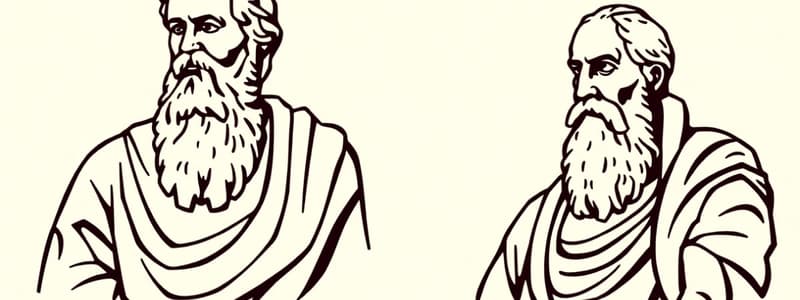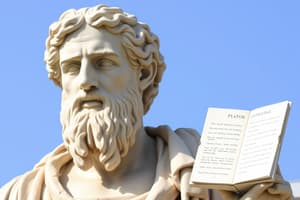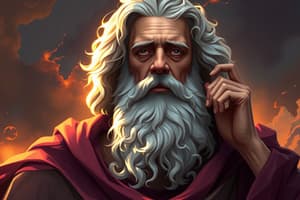Podcast
Questions and Answers
What is Meno's Paradox concerned with regarding the search for knowledge?
What is Meno's Paradox concerned with regarding the search for knowledge?
- There are different methods to acquire knowledge
- Knowledge is inherent and cannot be lost
- Knowledge is easily taught and learned
- It questions how one can search for something unknown (correct)
According to the Doctrine of Recollection, all knowledge is acquired in this life only.
According to the Doctrine of Recollection, all knowledge is acquired in this life only.
False (B)
Name the three parts of the soul according to Plato in the Republic.
Name the three parts of the soul according to Plato in the Republic.
Rational, Spirited, Appetitive
Virtue is recognized as a gift from the ______.
Virtue is recognized as a gift from the ______.
Match the following concepts with their descriptions:
Match the following concepts with their descriptions:
Flashcards
What is Virtue?
What is Virtue?
The central question Meno explores is the nature of virtue – what it is, whether it's a single quality or different for everyone, and how we acquire it.
Universal vs. Particular
Universal vs. Particular
Universal concepts refer to abstract ideas, like the essence of 'virtue.' Particular concepts are concrete examples of that idea, like specific virtues like courage or honesty.
Self-Conscious Ignorance
Self-Conscious Ignorance
Self-conscious ignorance is the realization that we don't know something, a crucial first step towards gaining knowledge and wisdom.
Doctrine of Recollection
Doctrine of Recollection
Signup and view all the flashcards
Allegory of the Cave
Allegory of the Cave
Signup and view all the flashcards
Study Notes
Meno
- Virtue is a concept to be defined universally.
- Virtue is a single quality applicable to all people, but how is it acquired?
- A good definition of virtue needs to be universal and address the essence of the concept.
- Universal vs. Particular: Universal concepts are abstract, particular concepts are concrete.
- Knowledge vs. Opinion: Knowledge is true, justified, and reliably understood. True opinion is an accurate belief without justification. False opinion is an incorrect belief.
- Self-Conscious Ignorance: Recognizing one's ignorance fosters a desire for knowledge, the first step to wisdom.
- Meno's Paradox (Debater's Argument): How can one search for something if you do not know what it is? If you do not know it, how can you know when you find it? If you already know it, why search?
- Doctrine of Recollection: All knowledge is retained from a previous life and recognized when encountered.
- Final Answer of Dialogue: Virtue is a divine gift, not a skill that can be taught.
Plato: Republic
- Allegory of the Cave: Prisoners in a cave only see shadows, representing illusions. One escapes and sees the real world.
- The allegory represents the journey of philosophers from ignorance to enlightenment.
- Three Parts of the Soul:
- Rational: Governs reason and wisdom.
- Spirited: Drives courage and ambition.
- Appetitive: Seeks physical desires and pleasures.
- Justice: Achieved when the rational part governs the other two.
Studying That Suits You
Use AI to generate personalized quizzes and flashcards to suit your learning preferences.




